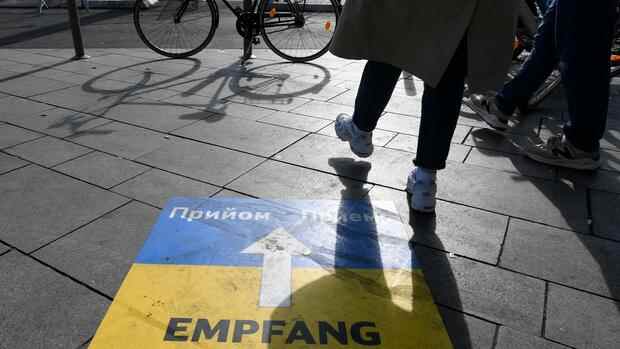Dusseldorf, Berlin Refugees who are coming to Germany from the Ukraine these days first need a roof over their heads, people who take care of them and peace and quiet. But the longer the war lasts, and the more cities and villages become uninhabitable for a long time due to shelling by the Russian army, the greater the need to offer those seeking protection a long-term perspective.
“It’s primarily about humanitarian aid,” said Labor Minister Hubertus Heil (SPD) last week in the budget debate in the Bundestag. “But it’s also about creating this opportunity for people who want to have the opportunity to work.” Heil is now inviting social partners, welfare associations, representatives of the federal states and the Federal Employment Agency (BA) to a summit meeting this Wednesday to Berlin to talk about labor market integration.
The number of new arrivals is now falling slightly. While the federal police counted more than 10,000 Ukrainian refugees a day in the first weeks of the war, it was recently only around 6,000. Almost 280,000 war refugees from Ukraine are now officially registered. The actual number is likely to be higher, however, since Ukrainians with a biometric passport are allowed to enter the country without a visa for 90 days.
Panu Poutvaara, migration researcher at the Ifo Institute and member of the Advisory Council on Integration and Migration (SVR), expects that most refugees will probably return to Ukraine as soon as the situation allows. “If a quick return is not possible, I see good prospects for integration, because the level of education of the refugees is comparatively high.”
Top jobs of the day
Find the best jobs now and
be notified by email.
This is also confirmed by Herbert Brücker from the Institute for Labor Market and Occupational Research (IAB). The qualification level of the Ukrainian population is high in international comparison, the proportion of academics is even slightly higher than in Germany. “The population from the Ukraine already living in Germany has a high level of education, with around 50 percent having university degrees,” says Brücker.
>> Read here: Lack of workers: corporations put pressure on immigration
In addition, according to the national statistical authority, women in Ukraine are mainly employed in academic, technical and medical professions – i.e. exactly in those sectors in which there is a shortage of skilled workers in this country. The refugees could help to reduce bottlenecks in the German labor market, at least in the medium term, emphasizes Brücker.
Activation of the EU mass influx directive enables rapid access to the labor market
The problem: “Most of the refugees initially have no knowledge of German, which limits their areas of activity.” And the integration takes time. Because unlike migrant workers, refugees are not prepared from the outset for living and working abroad.
The EU countries had already laid the foundation for rapid labor market integration at the beginning of March by activating the so-called mass influx directive. Refugees thus receive a limited right of residence without having to go through an asylum procedure, as well as access to minimum social standards and the labor market. In contrast, many Syrians, Iraqis or Afghans who had fled to Germany since 2015 often had to wait months for a work permit.
“Germany is at the forefront in terms of integration,” says Thomas Liebig, migration expert at the industrialized countries’ organization OECD, with a view to the Ukraine refugees. The federal government is interpreting the EU mass influx directive generously and granting unbureaucratic protection not only for up to two, but even up to three years. And the integration courses have already been opened to refugees from Ukraine.
Anja Piel, board member of the German Trade Union Confederation (DGB), calls on the traffic light coalition to significantly expand the range of language courses. “Particularly important are half-day courses with childcare – because many of those seeking protection are mothers with children.”
Childcare is not only important when the mothers want to learn German. Without them, it will also be difficult to get a job. But because many refugee women from Ukraine work in education, they can continue to teach the children in Ukrainian, stresses OECD researcher Liebig. Compulsory schooling is covered as well as childcare.
“Where possible, parents should be able to decide whether their children are taught in Ukrainian or in German,” agrees Ifo researcher Poutvaara. However, if it becomes apparent that the refugees will stay here longer, teaching Ukrainian can of course only be an interim solution, emphasizes Liebig.
>> Read here: IAB researcher Herbert Brücker on the Skilled Immigration Act: “The formal hurdles are still very high”
IAB labor market expert Brücker sees another possible hurdle on the way to labor market integration. The Ukrainian education and training system is different from the German one, so difficulties can arise in the recognition of professional qualifications.
A solution must be found quickly here, demands trade unionist Piel, so that “qualified Ukrainians do not end up in precarious employment”. The federal government has a duty here.
Minister of Labor Heil knows the problem. The rapid recognition of degrees is important, because otherwise there is a risk that “the plight of refugees will be exploited and they will be exploited by charlatans,” he said last week in the Bundestag. “We must and will ensure that the people who have suffered so much do not become victims of rip-offs or exploitation – not even in the world of work.”
More: Job exchange Poland: New home, new job, new prosperity – How the West attracts Ukrainian skilled workers
